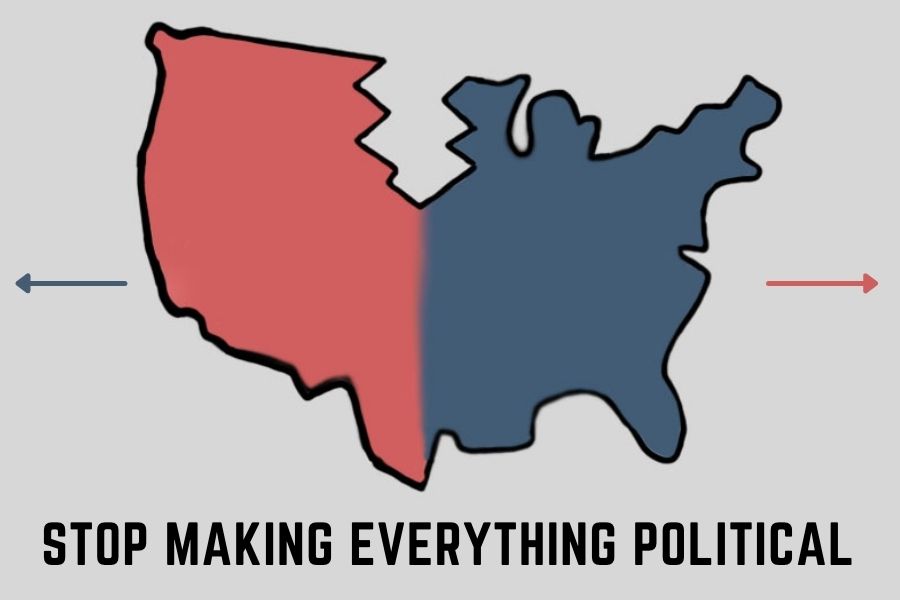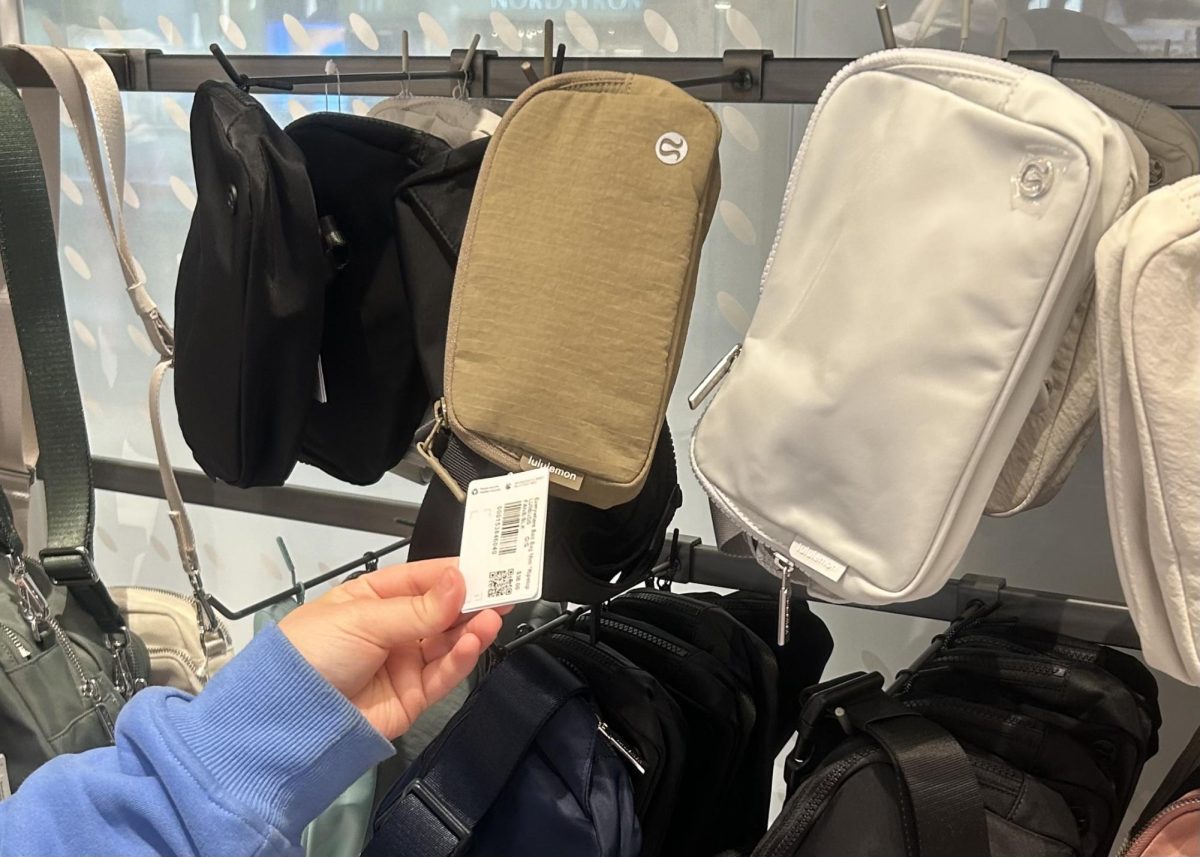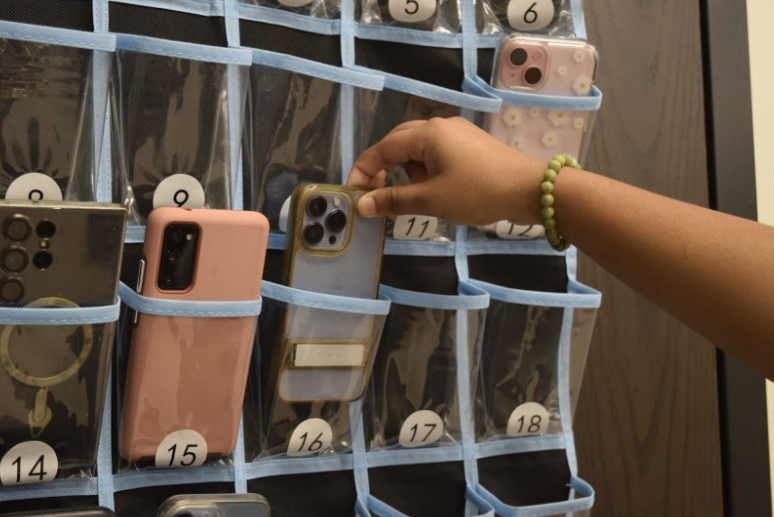Stop Making Everything Political
We’ve all heard the age-old advice to avoid talking politics at the dinner table. But in an age when everything seems to be political, what is there left to talk about? Politicization is a phenomenon that has invaded many aspects of our daily lives and has become all too common in the last few years.
Politicization is defined as giving a political tone or character to a topic or event. In recent years, this has become the norm. Almost everything that goes down in the news ends up with two sides pitted against each other, unwavering in their arguments. The political nature of pretty much everything holds so much power over our population, that political beliefs can shape everything from the celebrities we keep up with to the people we associate with.
Politicization has become increasingly prevalent in recent years. In fact, Pew Research Center has noted that disagreements have become increasingly severe between Democrats and Republicans on various current issues in the past few years. There is no doubt that this issue plaguing our society must be stopped.
The Perfect Storm
There are many factors that have contributed to politics overwhelming our world recently. While our two-party system is partly to blame, there are two factors that remain most prominent: America’s polarized media and political elites.
The media is a large proponent of politicization, but they’re not all to blame. Dramatic headlines, riddled with trigger words, can be interpreted as American media playing to the shock factor of their waiting audience. We have an inherent bad news bias, meaning we are drawn to tragedy, and the American media is representative of this issue. Regardless of their intent, the media has undoubtedly aggravated the divide in our political climate. American media has the power to shape their audience’s opinions on what they cover, yet their coverage did little besides further dividing our already disjointed society. It’s been proven that since the pandemic, the media has become noticeably more politicized. Take a look at almost any article about COVID-19 — it’s obvious that dramatic political views were the priority, not facts.
Not only was the media polarized on its coverage, but their approach also proved to have a political air as well. Democrats and Republicans were divided on the accuracy of coverage, whether or not the media was working to benefit society or help the country, and if journalists acted in the best interest of the country. Regardless of what each of these partisan groups believe, our American media placed precedence on trivial matters, instead of necessary, life-saving information. They further polarized our diverging society and demonstrated just how deeply the consequences of this pressing issue run. The bottom line is that our media shapes public opinion, and the glaringly obvious polarization in recent years is majorly to blame for our viciously political society.
While the media is a major player in the political game, elite political figures are also to blame for the trend dominating our society. Political figures have started to become idolized and regarded as characters, rather than public servants responsible for representing the beliefs of the American people. Because political figures are idolized in our society, individuals are more likely to blindly follow politicians over experts.
Oftentimes, variances in political beliefs regarding a certain topic can be attributed to the way that political elites respond to said topic. Politicians are components of a broken system that views the other side as enemies, and while it’s not entirely their fault that our society is so polarized, they are aware of this fact and use it to their advantage, which only makes the situation worse. By attacking the other side, using political buzzwords and just flat out dramatizing their actions for the press, politicians deepen the chasm between the left and right. Because of this phenomenon, nearly everything has some air of politics around it.
A few examples
Because politicization is an issue that runs so rampant in our society, there are countless examples of the trend. However, a few events, in particular, have changed entirely as a result of society twisting them to be political.
COVID-19 is a prime example of politicization (I bet you didn’t see that coming). Despite the fact that COVID-19 was declared an international public health emergency by the World Health Organization, the pandemic took on a political air and many continued to debate its existence due to various reasons, one being a misinformed politician who will not be named. Nearly every element of the pandemic turned into a political debate, from social distancing to masks to vaccines. We cannot effectively respond to the pandemic if we don’t abandon the politicization of COVID-19. I don’t want to beat a dead horse, but the main idea is that 5,220,384 people died from COVID-19, and it was completely and totally unnecessary to make the existence of a global pandemic a political argument.
Climate change is another topic that America has managed to turn into an argument. According to a study completed by the Reuters Institute at Oxford University, American media covers climate change differently than all other countries. Our media gives “significantly more space to skeptical [sic] voices, in all their manifestations… when compared to the rest of the world.” Political debates about how to approach issues are not inherently a problem, but the issue comes when scientific facts are debated and we, as a nation, fail to take action, because our views are clouded by anger.
Politicization even seeps into school systems. This issue was exacerbated by the 2016 election, which spurred and encouraged educational politicization. There have been violent debates regarding the extent that history can be politicized in schools. The result is a divided school system across the nation. For example, McGraw-Hill — a publisher that we use for textbooks — has different editions of their textbooks for different states. Their California textbook places a greater emphasis on racial history in the United States, while the Texas edition avoids this. The California edition also references current gun laws within their discussion of the Bill of Rights, while this annotation is not present in the Texas book. We must present the facts without letting our own political biases influence them. While politicians in these states may rejoice in the fact that their beliefs are being represented in the school systems, the reality is that this will result in entire generations of students that miss out on being able to form their own opinions based on factual information. Our biases should not hold this much power over the fate of our society.
So, what now?
Political debates are not a problem. Having certain political allegiances is not the problem. Even adamantly disagreeing on a political issue is not a problem. The issue lies in the fact that politicization runs so deep in our society today it shapes nearly every aspect of our daily lives.
When every issue that we face together, as a nation, takes on a political nature, we become divided. When, in reality, we should unite as a common force to tackle the issue. If issues are politicized, we can not effectively solve them. Furthermore, politicization takes away from facts and is a major player in the misinformation crisis. Because of this issue, facts and science take a backseat, as beliefs and opinions of political elites are prioritized. Politicians must avoid letting their agendas dominate their response to serious issues.
The media is another large proponent of misinformation. Instead of covering the dramatics, they should focus on looking to make a positive difference with their coverage and spread crucial information. We need to place facts front and center, and let individuals form their own opinions. Politicization stands in the way of progress.
At a more personal level, if you are leading a politicized life, you are putting yourself at a disadvantage. I’m sure you have heard someone say they don’t like someone because they are “too conservative” or “too liberal,” but someone’s political beliefs can form your impression of them. You are missing out on an entire group of people solely because of their beliefs. You are missing out on viewpoints and perspectives. You are missing out on living life because you are caught up in trivial arguments about topics we shouldn’t even be arguing about.
Make a change. Politicians shouldn’t prioritize their own beliefs, and the media should become less polarized. But they aren’t reading this article, you are. America has hardly ever been as polarized as it is today, but you can change this fact. Our society must change the way that we regard politics. We can’t let a person’s political beliefs form our opinion of them, we must act as a united force against problems and we must stop making everything political.




![Senior Dhiya Prasanna examines a bottle of Tylenol. Prasanna has observed data in science labs and in real life. “[I] advise the public not to just look or search for information that supports your argument, but search for information that doesn't support it,” Prasanna said.](https://pwestpathfinder.com/wp-content/uploads/2025/10/DSC_0073-2-1200x800.jpg)
![Junior Fiona Dye lifts weights in Strength and Conditioning. Now that the Trump administration has instituted policies such as AI deregulation, tariffs and university funding freezes, women may have to work twice as hard to get half as far. "[Trump] wants America to be more divided; he wants to inspire hatred in people,” feminist club member and junior Clara Lazarini said.](https://pwestpathfinder.com/wp-content/uploads/2025/05/Flag.png)
![As the Trump administration cracks down on immigration, it scapegoats many immigrants for the United States’ plights, precipitating a possible genocide. Sophomore Annabella Whiteley moved from the United Kingdom when she was eight. “It’s pretty scary because I’m on a visa. When my visa expires next year, I’m not sure what’s going to happen, especially with [immigration] policies up in the air, so it is a concern for my family,” Whiteley said.](https://pwestpathfinder.com/wp-content/uploads/2025/05/DSC_0077-7copy.jpg)
![Shifting global trade, President Donald Trump’s tariffs are raising concerns about economic stability for the U.S. and other countries alike. “[The tariffs are] going to pose a distinct challenge to the U.S. economy and a challenge to the global economy on the whole because it's going to greatly upset who trades with who and where resources and products are going to come from,” social studies teacher Melvin Trotier said.](https://pwestpathfinder.com/wp-content/uploads/2025/05/MDB_3456-1200x800.jpg)



![Some of the most deadly instances of gun violence have occurred in schools, communities and other ‘safe spaces’ for students. These uncontrolled settings give way to the need for gun regulation, including background and mental health checks. “Gun control comes about with more laws, but there are a lot of guns out there that people could obtain illegally. What is a solution that would get the illegal guns off the street? We have yet to find [one],” social studies teacher Nancy Sachtlaben said.](https://pwestpathfinder.com/wp-content/uploads/2025/01/DSC_5122-1200x800.jpg)


![Focused on providing exceptional service, sophomore Darsh Mahapatra carefully cleans the door of a customer’s car. Mahapatra has always believed his customers deserve nothing less than the best. “[If] they’re trusting us with their car and our service, then I am convinced that they deserve our 100 percent effort and beyond,” Mahapatra said.](https://pwestpathfinder.com/wp-content/uploads/2025/10/DSC_0018-1200x800.jpg)
![Sophomore Aleix Pi de Cabanyes Navarro (left) finishes up a soccer game while junior Ava Muench (right) warms up for cross country practice. The two came to Parkway West High School as exchange students for the 2025-2026 school year. “The goal for the [exchange] program is to provide opportunities for both Parkway students and our international exchange students to learn about other cultures, build connections and become confident, capable, curious and caring — Parkway’s Four C’s — in the process,” Exchange Program Lead Lauren Farrelly said.](https://pwestpathfinder.com/wp-content/uploads/2025/10/Feature-Photo-1200x800.png)
![Leaning on the podium, superintendent Melissa Schneider speaks to Parkway journalism students during a press conference. Schneider joined Parkway in July after working in the Thompson School District in Colorado. “My plan [to bond with students] is to get things on my calendar as much as possible. For example, being in [classes] is very special to me. I am trying to be opportunistic [meeting] kids [and] being in [the school] buildings. I have all the sports schedules and the fine arts schedules on my calendar, so that when I'm available, I can get to them,” Schneider said.](https://pwestpathfinder.com/wp-content/uploads/2025/09/IMG_5425-1200x943.jpeg)
![Gazing across the stage, sophomore Alexis Monteleone performs in the school theater. The Monteleone family’s band “Monte and the Machine” has been releasing music since 2012, but Alexis started her own solo career in 2024 with the release of her first single, Crying Skies. “My whole family is very musical, [and I especially] love writing [songs with them],” Monteleone said.](https://pwestpathfinder.com/wp-content/uploads/2025/09/DSC7463-1200x798.jpg)

![Leaping through the air, senior Tyler Watts celebrates his first goal of the season, which put the Longhorns up 1-0 against the Lafayette Lancers. Watts decided to play soccer for West for his last year of high school and secured a spot on the varsity roster. “[Playing soccer for West] is something I had always dreamed of, but hadn’t really had a good opportunity to do until now. It’s [really] fun being out [on the field], and I’m glad I decided to join the team. It’s just all about having fun with the boys and enjoying what time we have left together,” Watts said.](https://pwestpathfinder.com/wp-content/uploads/2025/09/DSC_1951-1200x855.jpg)


![Pitching the ball on Apr. 14, senior Henry Wild and his team play against Belleville East. Wild was named scholar athlete of the year by St. Louis Post-Dispatch after maintaining a high cumulative GPA and staying involved with athletics for all of high school. “It’s an amazing honor. I feel very blessed to have the opportunity to represent my school [and] what [it] stands for,” Wild said.](https://pwestpathfinder.com/wp-content/uploads/2025/05/unnamed-6-1200x714.jpg)
![Red, white and blue, the American flag holds the values of our democracy. The fight that we once endured has returned, as student journalists and senior correspondents across the country are losing their voices due to government control. “[Are] the White House and [the] government limiting free speech [and] freedom of the press? Yes [they are],” chief communications officer of the Parkway School District and former journalist Elisa Tomich said.](https://pwestpathfinder.com/wp-content/uploads/2025/03/Untitled-design-14.jpg)

Joseph Denklau • Dec 2, 2021 at 8:03 pm
The best article I have ever read. It was a very honest, well-supported, and very needed article. Thank you so much for this article!